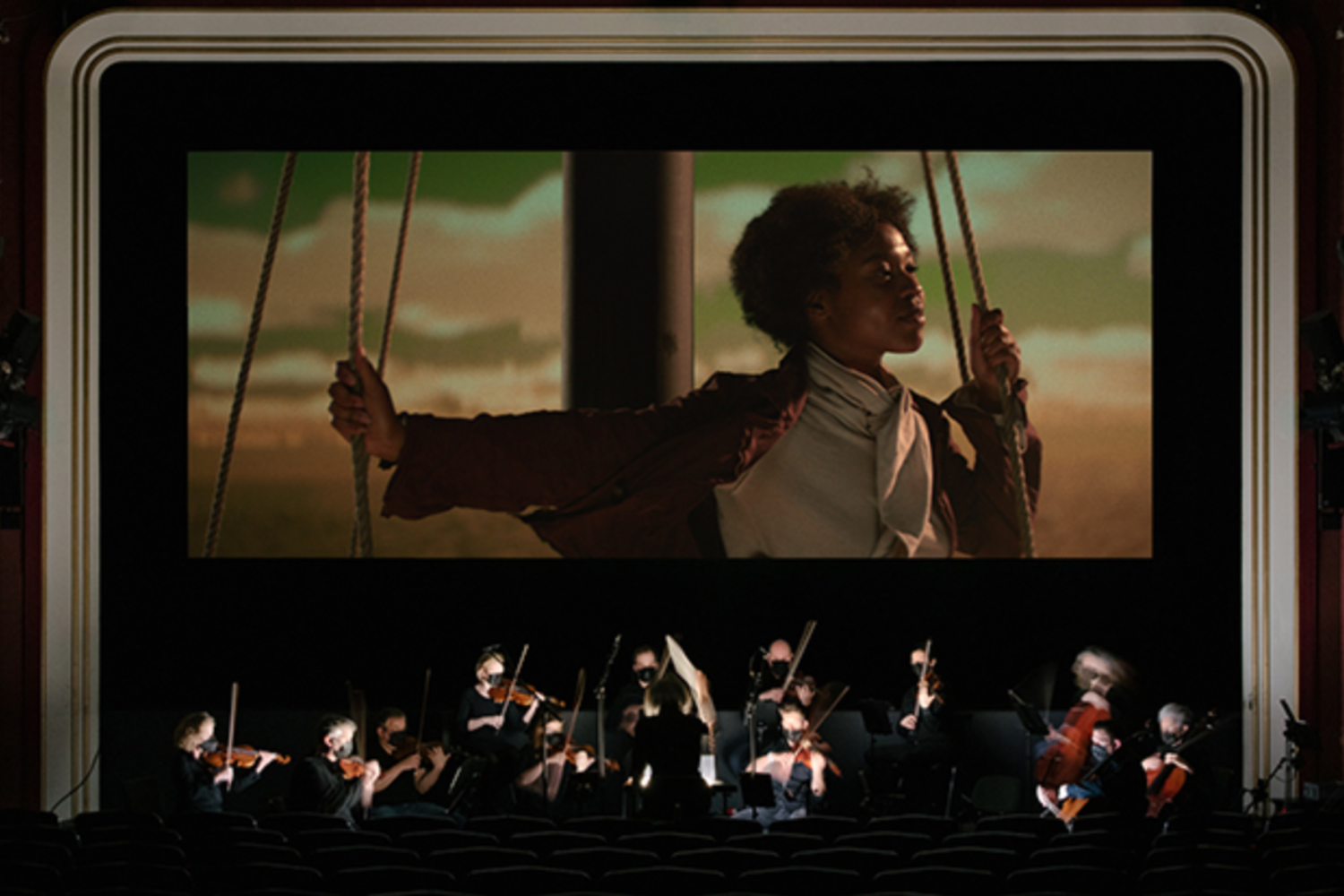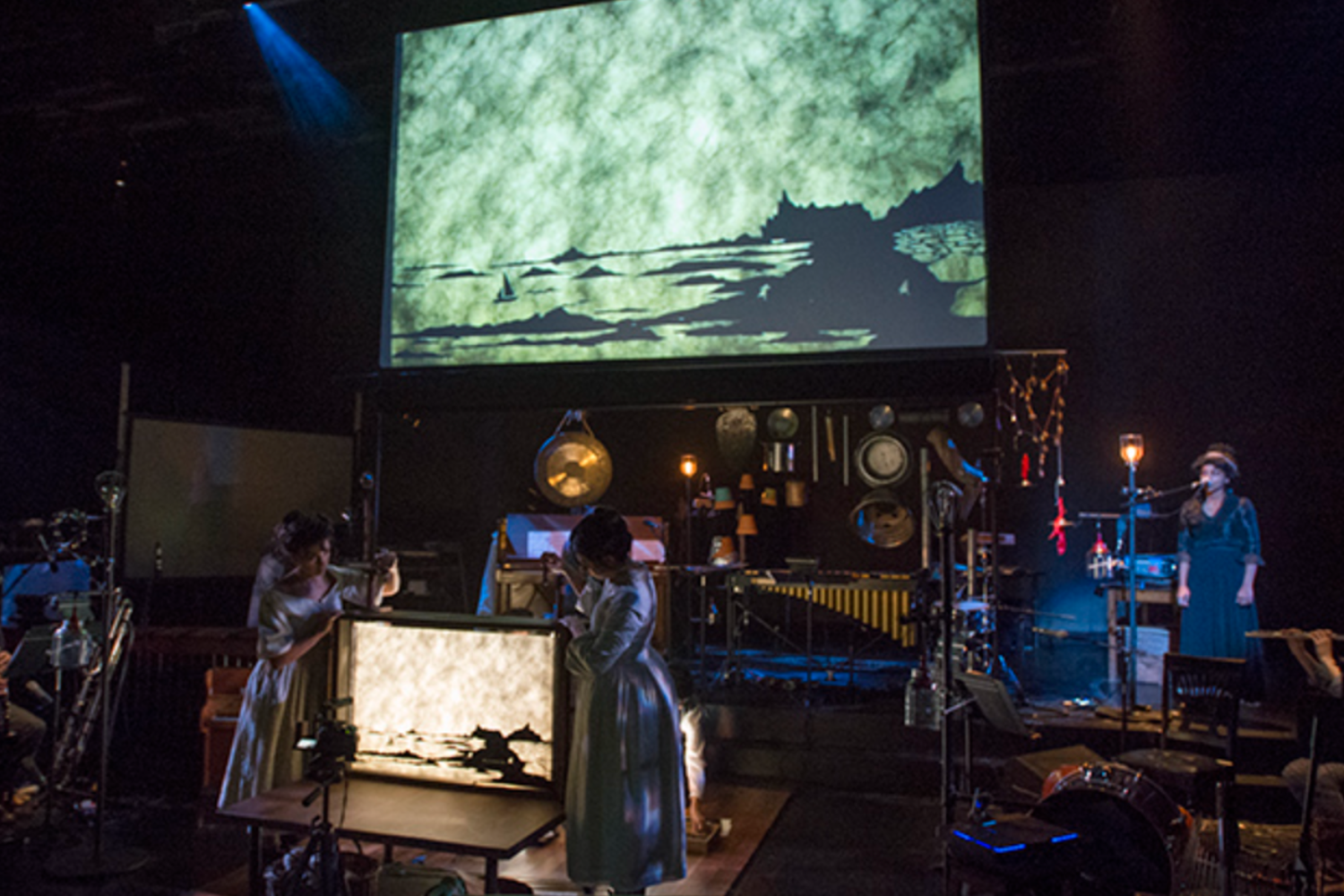Stanford Live presents reimagined versions of stories you thought you knew
Director of programming Laura Evans discusses staging this season's theme of reflection and reinvention, including a modern retelling of Frankenstein using shadow puppetry, film, and live music.

The film adaptation of Moby Dick was shot on a sound-stage, using silent-era filmmaking techniques and a VR game engine projecting a surreal ocean. (Image credit: Courtesy of Moved by the Motion)
How would the tales of Rudyard Kipling’s The Jungle Book, published in 1894, be retold against the backdrop of today’s climate crisis? What if Shakespeare’s Romeo and Juliet survived the poison and now, after 20 years of marriage, find themselves in couples therapy facing a midlife crisis?
In the coming months, these questions and others requiring reflection and reinvention will be explored on Stanford stages through stories and music we know well, beginning with Frankenstein and Moby Dick; or The Whale in November, Jungle Book Reimagined in December, an exploration of women in jazz in January, and Juliet & Romeo in February.
In an interview, Laura Evans, director of programming and engagement at Stanford Live, talks about the impact of thematic programming and the evolution of storytelling and performance practice.
Stanford Live builds each season around a theme. Walk us through the genesis for this season’s theme of reflection and reinvention.
The initial insight for the 2023-24 theme came from choreographer Akram Khan’s dance-theater production of Jungle Book Reimagined. Khan and his team reinvent the journey of Mowgli through the eyes of a climate refugee. Featuring an original score, ten international dancers, and state-of-the-art animation and visuals, Jungle Book Reimagined is a compelling and vital piece of storytelling about our intrinsic need to belong and bond with others and placing the importance of connecting with and respecting our natural world at its heart.
“Aren’t we all reflecting on previous ways of doing things, on how values inform our decisions and lives, and attempting to reinvent with more alignment with these things?”
—Laura Evans
Director of programming and engagement at Stanford Live
In addition to the new 21st-century context for the story, we were interested in the company’s consideration of the carbon footprint of touring international dance and theater and how they were trying to address some systemic issues with the international touring model of freighting large sets and flying specific dancers and company members around the world. For Jungle Book Reimagined, they decided to lean into video projection over physical sets and create sets using locally sourced cardboard boxes.
We realized that our inquiry into reflection and reinvention was really about reinventing the field and artistic practice, and we wanted to use this as a framing question for the whole season. Coming out of the pandemic, the words “reflection” and “reinvention” make for a very relatable framing. Aren’t we all reflecting on previous ways of doing things, on how values inform our decisions and lives, and attempting to reinvent with more alignment with these things? That led to choosing companies and works that reinvent standard practice, like Wu Tsang and her interdisciplinary, queer take on Moby Dick. Another example is Frankenstein by Manual Cinema, a company whose very ethos is about scrappy reinvention, with beautifully crafted shadow puppets.

The Chicago-based performance collective Manual Cinema combines shadow puppetry, cinematic techniques, sound effects, and live music in a haunting version of Frankenstein. (Image credit: Michael Brosilow)
Why is thematic programming necessary for a performing arts presenter? And how does being at a university enhance or challenge this approach?
I don’t know if thematic programming is necessary, but we find having a set of questions to consider is a productive way to generate a season. There is so much great art out there, and it helps us make some choices based on what resonates with the theme and what prompts we are lightly putting out there. Fundamentally, we are interested in artists’ voices and how they might be grappling with issues and channeling the zeitgeist.
In addition to four reimagined theatrical performances of familiar stories, this season’s theme led to some avenues to explore in musical performance. Thinking about jazz, for example, the form is about constant invention and reinvention in the moment. However, the structures that support this creative music tend to be predominantly male and heteronormative and, as such, are ripe for reinvention. I wanted to follow the lead of American jazz drummer, composer, producer, and educator Terri Lyne Carrington, who asks, why isn’t the ecosystem for jazz more inclusive? So we included Terri Lyne this season with an artist residency and decided to focus on contributions by women in jazz.
Being at a university like Stanford gives us a unique opportunity to engage with ideas, scholars, and thinkers beyond the arts. I think the biggest challenge in any given season is choosing where to focus energy and attention to engage a campus that has so much going on all the time.
The first of the four thematic performances this season is the classic gothic tale Frankenstein, which in the updated version considers what happened in the life of Mary Shelley that led her to create the world’s most famous monster. What does this new lens bring to our understanding of love, loss, and creation?
The Frankenstein story is a source of such endless fascination, and this production renders the story from multiple points of view. Weaving in Mary Shelley’s heart-rending experience of losing a child and her fraught relationship with her famous husband brings the themes of loss and loneliness home and helps us understand better the characters of the monster and Dr. Frankenstein. I am interested in how this wordless, immersive visual play allows us to access the deeper emotional registers of Shelley’s experience transmuted into a horror tale for the ages. Manual Cinema is such an incredible company in the way it inhabits a story and plumbs its depths to reveal something new about it.
“Fundamentally, we are interested in artists’ voices and how they might be grappling with issues and channeling the zeitgeist.”
—Laura Evans
What do you want audiences to reflect on in the other two productions and the jazz residency?
That the reason these stories have stood the test of time is that they are durable and that the meaning we derive from them can evolve. These stories can withstand being turned upside down, torn apart, and reconstructed.
Wu Tsang’s feature-length, silent-film retelling of Herman Melville’s great American novel, Moby Dick, follows the white whale above and below the surface of the water, developing a visual cosmology that resists the exploration and exploitation of the earth under imperial colonialism.
Lost Dog’s Juliet & Romeo takes on our obsession with youth and the inevitable issues with romantic longevity. In this version, Shakespeare’s most revered couple didn’t die in a tragic misunderstanding. Rather, after two decades of marriage, the couple finds themselves facing a crisis in their relationship.
And near and dear to my heart, jazz is about searching and questioning and not accepting the status quo – it can provide a model for making space for diverse voices and collaboration across differences.